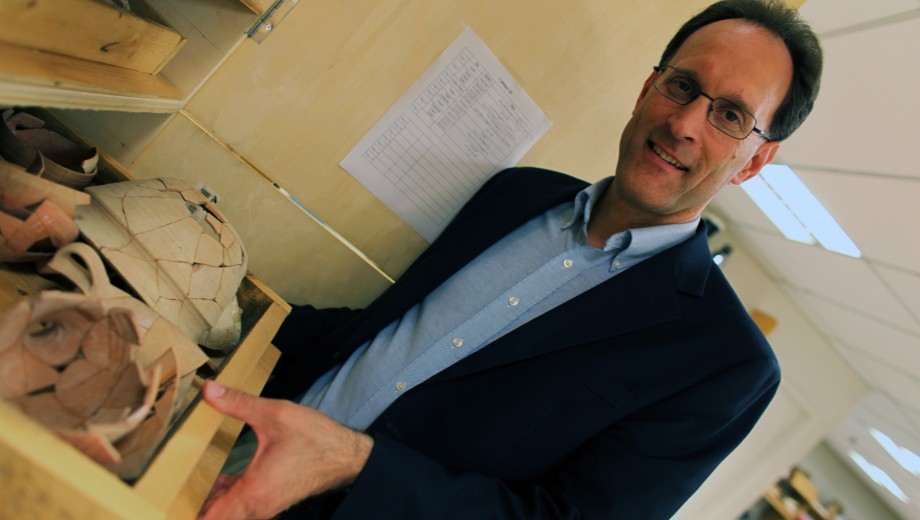Until Timothy P. Harrison, AM’91, PhD’95, became the director of the Institute for the Study of Ancient Cultures, West Asia and North Africa (ISAC) on September 1, 2023, the last time he’d sat in the director’s office was when he successfully defended his dissertation, a study of Bronze Age human adaptation to the arid highlands of central Jordan. That day—July 14, 1995—was one of the hottest on record for Chicago. Even though the room was air conditioned, Harrison says, he remembers sweating profusely.
Twenty-eight years later, he returns to the hot seat to face different challenges. “ISAC is at a tipping point,” says Harrison, also a professor in the Department of Near Eastern Languages and Civilizations. “Some people do not understand the relevance of archaeology for today’s problems. We need to participate in larger conversations about global issues such as climate change, conflicts in the Middle East, the destruction and reconstruction of cultural artifacts.”
While contemplating ISAC’s larger role in the world, Harrison spoke with Tableau about his belief in the essential scholarship of the humanities at UChicago, his step back from spearheading multifaceted research projects, and his fascination with the rise of early civilizations in the ancient Middle East.
After working at the University of Toronto for 27 years, why did you want to return to ISAC at UChicago?
I loved my years at the University of Toronto and was not looking to leave my position. However, I was approached to consider the position of director at ISAC and professor in Near Eastern Languages and Civilizations. As the conversation evolved over many visits, those extended discussions drew me to ISAC and UChicago.
I am excited to be here because of the great energy and enthusiasm. It’s an ideal time to be at ISAC. For the first year, I am focused on wrapping my head around the museum and engaging with what’s happening now. After this initial deep dive into ISAC, I plan also to teach courses in the archaeology of the Eastern Mediterranean.
Will you still be doing fieldwork in this position at ISAC?
At the University of Toronto, I was directing three complex, collaborative research projects in Syria, Iraq, and southeastern Turkey during my annual months of fieldwork. In my current role, unfortunately, I can no longer be the front person on these projects. I must figure out ways to step back while still facilitating this work. I would, however, like to continue being involved with field research. It is hard to let it go completely.
Why did you become interested in the rise of civilizations in the ancient Middle East?
One of my mentors was Douglas L. Esse [AM’77, PhD’82], who focused on the rise of complex societies in the city-states of the ancient Middle East. He sparked my interest in the small-scale complex societies of the southern Levant—areas in modern Lebanon, Jordan, Palestine, Israel, and Syria. Sadly, Esse died in his early 40s, while I was in my doctoral program.
My dissertation addressed whether these smaller cultures were integrated into larger states and into Egypt and Mesopotamia. Through analysis of empirical datasets, I found they were profoundly different and complex. Within these small city-states, alliances and groups were fluid and dynamic. It became clear that the commonly held view of many scholars, including my dissertation advisers—first Esse, and after Esse’s passing, McGuire Gibson [AM’64, PhD’68, Professor Emeritus of Mesopotamian Archaeology]—that they replicated larger states, only on a smaller scale, was not true.
In much the same way, my students have now begun to challenge theories and understandings about the ancient Middle East that I once espoused, which has been quite gratifying. Extensive fieldwork allows teachers and students to develop new approaches and methodologies, even showing how the contemporary and ancient past connect and intertwine.

